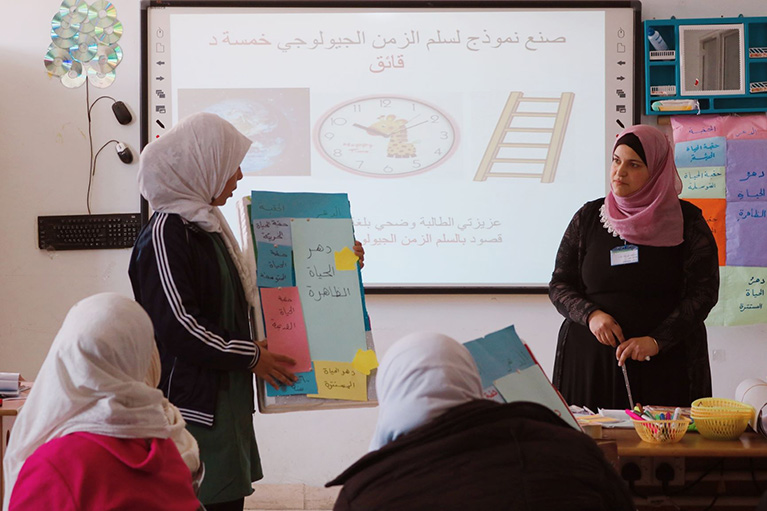Survey highlights public perceptions of Jordan’s teaching profession

In September 2020, the USAID Preservice Teacher Education in Jordan program launched its National Perceptions of the Teaching Profession survey (PDF, 1.1 MB) to assess the Jordanian public’s perceptions of the teaching profession. Results from the survey show that, unfortunately, teaching is not perceived by many people as a prestigious career, and significant gaps exist in the public’s understanding of how to qualify for, or enter, the profession.
In support of broad education system reforms envisioned by the Government of Jordan, the United States Agency for International Development (USAID) has partnered with IREX to launch the USAID Preservice Teacher Education in Jordan program to collaborate with partner universities on successfully designing, planning, and implementing preservice teacher education programs that attract both male and female students.
The collaboration also provides technical assistance to the Ministry of Education in Jordan to improve government systems, policies, and practices related to preservice teacher education. To lay a strong foundation for these important reform recommendations, the program has undertaken several critical in-depth research efforts, including the nationwide survey in September 2020.
The survey used a stratified, random sampling method targeting all adults living in Jordan ages 16 and up. Equal representation of males and females was sought via the sampling methodology. The sample was designed to produce representative results for each of the three regions and 12 governorates of the country. To ensure adequate representation, a minimum sample of 1,600 was identified with proportional numbers of responses sought from each region.
The survey’s first objective was to understand how Jordanians view the teaching profession. Information gathered from the survey will help to inform program strategies to improve the teaching profession’s public image, attracting and retaining more and better applicants to teacher training programs for the public-school system.
The second objective was to assess what Jordanians know about the process of entering the teaching profession. Responses will help guide and inform interventions to raise awareness and set a baseline to measure progress for recruitment, outreach, and engagement throughout the program’s life cycle.
The survey revealed the following important findings:
- Status of the teaching profession: The survey’s responses indicated that Jordanians generally do not perceive teaching as a prestigious career path. When asked to rate the status of ten professions, respondents accorded teachers at both public and private schools the lowest level of status, alongside government sector employees.
- Influencing factors to entering the teaching profession: Respondents indicated that friends and schoolteachers had notable influence over both genders when considering entering the profession in Jordan. The location of schools and proximity to potential applicants’ homes, as well as summer and winter vacations, were the most attractive factors to respondents. On the contrary, respondents found chances of career advancement and salary of teachers to be the least considered motivating factors. To find these results, the survey asked respondents to choose from a list of factors that might influence their decision if they themselves were to consider entering the teaching profession in public schools.
- Understanding of the qualification process for the teaching profession: Providing eight potential options, the survey asked respondents to select from them the four correct and necessary steps for how to become a grade 4–10 teacher in the public sector. Only 8% were able to correctly select the four steps; of those, 79% now or in the past worked in education, as a teacher or otherwise. Forty-one percent of respondents were unable to correctly select even one required career step, highlighting a major gap that needs to be filled in the public’s understanding of teacher qualification processes.
The National Perceptions of the Teaching Profession survey has illuminated existing gaps in preservice teacher education in Jordan, alongside opportunities for improving the perceptions of the teaching profession in the country and raising understanding of how to become a teacher. Further research is needed and should include an investigation on how different types of media could be used to reach certain target populations, factors that motivate or deter prospective teachers, and the role of schoolteachers in motivating others to become teachers themselves. Two follow-up National Surveys on Public Perceptions of the Teaching Profession are planned for 2022 and 2024 to assess changes in attitudes and awareness across the country.
If you have questions or comments, please contact Mohammed Alhammami malhammami@irex.org.